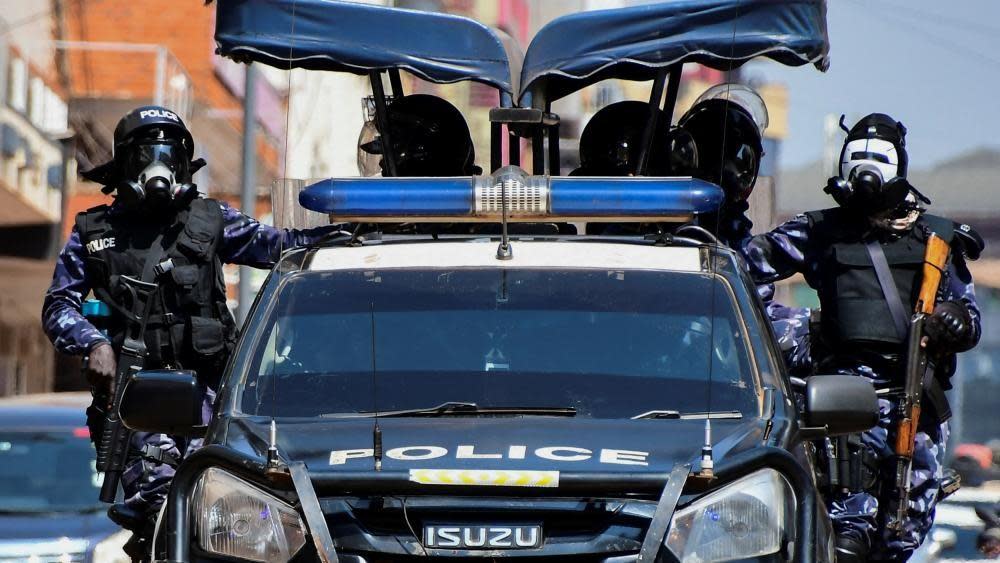Uganda protester sexually assaulted in police cell - lawyer

- Oops!Something went wrong.Please try again later.
A Ugandan activist, one of dozens detained this week for participating in banned demonstrations, was sexually assaulted in custody, his lawyer has said.
More than 90 youths were arrested and some were charged with being a public nuisance following anti-corruption protests that hit the capital, Kampala.
Some of those released from detention have also reportedly said they had been sexually assaulted while in police cells, sparking widespread criticism. But police denied the allegation.
The two days of anti-corruption demonstrations went ahead on Tuesday and Thursday despite a warning from President Yoweri Museveni that the protesters were "playing with fire".
The protesters, inspired by recent anti-tax demonstrations in Kenya, were demanding the resignation of the parliamentary speaker, who has been accused of corruption, which she has denied.
But the Ugandan riot police quickly stopped the protests, bundling several young activists, including a prominent TV presenter, into the back of lorries.
Some are facing a variety of charges but an unknown number remain in police custody, local media reported.
Referring to the allegations of sexual assault his client experienced, lawyer Eron Kiiza said while it was not common for people to be attacked like this in police cells it did happen.
"He was sodomised immediately after he was detained," he told the BBC.
The US embassy in Kampala said in a statement: "We urge that any allegations of individuals assaulted in detention be investigated and perpetrators be held accountable."
However, police spokesperson Kituuma Rusoke dismissed the allegations as "unfounded" and "malicious".
"The police are very conscious of the rights of suspects and take their responsibilities seriously," Mr Rusoke added in a statement.
Mr Kiiza explained that the police believe the protesters are backed by foreign funders - a reference to those who have cut funding or were critical of Uganda for adopting the world’s harshest anti-homosexuality laws last year.
“The police think that gay people are funding the protests,” he said, adding that his client was told during the assault: “’Now you earn it.’
"It happens in the wake of desperation of some guys in the police [who are trying] to find a connection between the protests and the so-called foreign funders," the lawyer said.
"It is like a revenge act."
Mr Kiiza said he had medical documents that show the sexual abuse and he would use them to sue the authorities once his client was done with treatment and rehabilitation.
He declined to name his client or the station where the alleged abuse took place, citing security fears.
Other activists, both male and female, were also sexually abused while in detention, opposition leader Bobi Wine has alleged.
"Only a few of them had the courage to publicly speak about their ordeal. Very many of them have reported to us but fear or feel ashamed to speak about it in public," Bobi Wine, a former pop star whose real name is Robert Kyagulanyi, added.
The allegation has sparked uproar on social media with Ugandans calling for an independent investigation into the matter.
"If true, the people doing that may the Lord judge you!" Youth Minister Balaam Barugahara Ateenyi, posted on X.
The minister acknowledged that the allegations were dehumanising and said the country's police chief should investigate them.
On Thursday, President Museveni praised the police for shutting down the protests, which he said had been funded by “foreign sources”.
“Very bad things” would be revealed in court about the protesters, he added in his post on X.
Amnesty International has called for an immediate and unconditional release of all those who were arrested.
“The heavy-handed tactics used by the Ugandan government to stifle and silence peaceful protesters show a manifest clampdown on dissent," the rights group added in a statement.
You may also be interested in:

Go to BBCAfrica.com for more news from the African continent.
Follow us on Twitter @BBCAfrica, on Facebook at BBC Africa or on Instagram at bbcafrica

